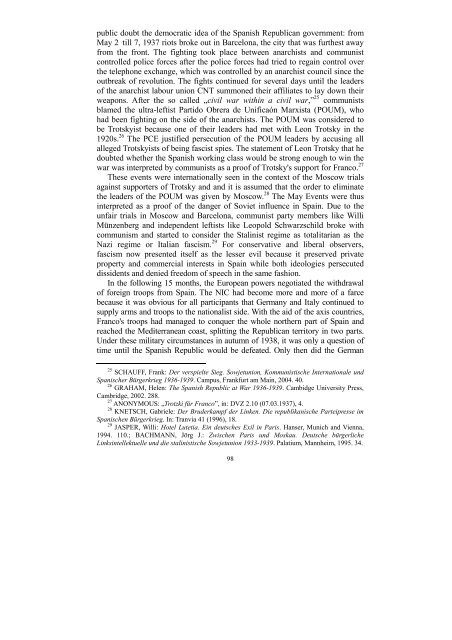The Molotov-Ribbentrop Pact - ELTE BTK Történelem Szakos Portál
The Molotov-Ribbentrop Pact - ELTE BTK Történelem Szakos Portál
The Molotov-Ribbentrop Pact - ELTE BTK Történelem Szakos Portál
Create successful ePaper yourself
Turn your PDF publications into a flip-book with our unique Google optimized e-Paper software.
public doubt the democratic idea of the Spanish Republican government: from<br />
May 2 till 7, 1937 riots broke out in Barcelona, the city that was furthest away<br />
from the front. <strong>The</strong> fighting took place between anarchists and communist<br />
controlled police forces after the police forces had tried to regain control over<br />
the telephone exchange, which was controlled by an anarchist council since the<br />
outbreak of revolution. <strong>The</strong> fights continued for several days until the leaders<br />
of the anarchist labour union CNT summoned their affiliates to lay down their<br />
weapons. After the so called „civil war within a civil war,” 25 communists<br />
blamed the ultra-leftist Partido Obrera de Unificaón Marxista (POUM), who<br />
had been fighting on the side of the anarchists. <strong>The</strong> POUM was considered to<br />
be Trotskyist because one of their leaders had met with Leon Trotsky in the<br />
1920s. 26 <strong>The</strong> PCE justified persecution of the POUM leaders by accusing all<br />
alleged Trotskyists of being fascist spies. <strong>The</strong> statement of Leon Trotsky that he<br />
doubted whether the Spanish working class would be strong enough to win the<br />
war was interpreted by communists as a proof of Trotsky's support for Franco. 27<br />
<strong>The</strong>se events were internationally seen in the context of the Moscow trials<br />
against supporters of Trotsky and and it is assumed that the order to eliminate<br />
the leaders of the POUM was given by Moscow. 28 <strong>The</strong> May Events were thus<br />
interpreted as a proof of the danger of Soviet influence in Spain. Due to the<br />
unfair trials in Moscow and Barcelona, communist party members like Willi<br />
Münzenberg and independent leftists like Leopold Schwarzschild broke with<br />
communism and started to consider the Stalinist regime as totalitarian as the<br />
Nazi regime or Italian fascism. 29 For conservative and liberal observers,<br />
fascism now presented itself as the lesser evil because it preserved private<br />
property and commercial interests in Spain while both ideologies persecuted<br />
dissidents and denied freedom of speech in the same fashion.<br />
In the following 15 months, the European powers negotiated the withdrawal<br />
of foreign troops from Spain. <strong>The</strong> NIC had become more and more of a farce<br />
because it was obvious for all participants that Germany and Italy continued to<br />
supply arms and troops to the nationalist side. With the aid of the axis countries,<br />
Franco's troops had managed to conquer the whole northern part of Spain and<br />
reached the Mediterranean coast, splitting the Republican territory in two parts.<br />
Under these military circumstances in autumn of 1938, it was only a question of<br />
time until the Spanish Republic would be defeated. Only then did the German<br />
25<br />
SCHAUFF, Frank: Der verspielte Sieg. Sowjetunion, Kommunistische Internationale und<br />
Spanischer Bürgerkrieg 1936-1939. Campus, Frankfurt am Main, 2004. 40.<br />
26<br />
GRAHAM, Helen: <strong>The</strong> Spanish Republic at War 1936-1939. Cambidge University Press,<br />
Cambridge, 2002. 288.<br />
27<br />
ANONYMOUS: „Trotzki für Franco”, in: DVZ 2.10 (07.03.1937), 4.<br />
28<br />
KNETSCH, Gabriele: Der Bruderkampf der Linken. Die republikanische Parteipresse im<br />
Spanischen Bürgerkrieg. In: Tranvia 41 (1996), 18.<br />
29<br />
JASPER, Willi: Hotel Lutetia. Ein deutsches Exil in Paris. Hanser, Munich and Vienna,<br />
1994. 110.; BACHMANN, Jörg J.: Zwischen Paris und Moskau. Deutsche bürgerliche<br />
Linksintellektuelle und die stalinistische Sowjetunion 1933-1939. Palatium, Mannheim, 1995. 34.<br />
98













